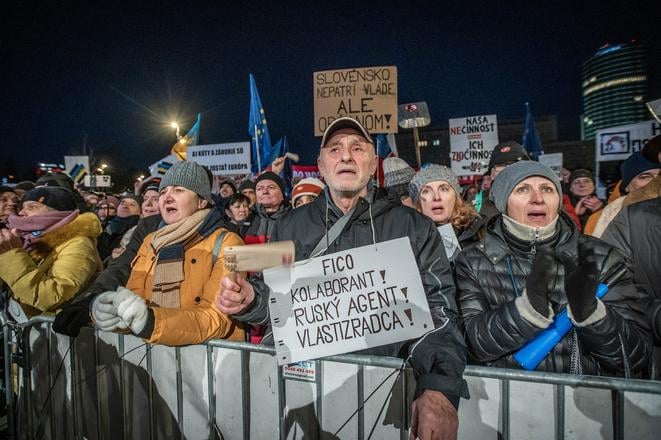Prime Minister Robert Fico would gladly take the same steps many autocrats have taken. He would love to ban and suppress peaceful protests that trigger his traumatic memories of 2018, when public pressure forced him to resign following the murder of journalist Ján Kuciak and his fiancée Martina Kušnírová.
Turkish President Recep Tayyip Erdoğan suppressed several protests with violent police crackdowns and mass arrests, claiming they were anti-state activities funded from abroad.
Belarusian dictator Alexander Lukashenko used violence, mass detentions, and torture of detainees to quash protests against electoral fraud in 2020. He, too, spoke of anti-state activities.
Chinese leader Xi Jinping’s government suppressed pro-democracy protests in Hong Kong in 2019–2020 without needing any justification.
In Georgia, governments over the years have cracked down on demonstrators. In 2023, police used tear gas and water cannons to disperse protesters and arrested over 130 people.
Fortunately, Slovakia is a member of the European Union, meaning Fico cannot fully indulge in these tempting solutions to his issues with peacefully expressed civic discontent.
The master and his disciple
Still, he can draw inspiration from Hungarian Prime Minister Viktor Orbán, who “spontaneously” visited him in Bratislava on the very day - January 21 - Fico prevented parliament from publicly discussing a motion to oust him.
He exploited the secret service, which produced a report based on a mass email, and sent a message to the public that the opposition was plotting a coup to destabilise Slovakia.
At a joint press conference, Fico stated that his meeting with Orbán reinforced his belief in the importance of his efforts towards a sovereign Slovak foreign policy, especially following Donald Trump’s victory in the USA.
It was clear that Orbán, accompanied by his propagandists, had come to support Fico.
Assuming Orbán advised him on how to keep “anti-state forces” under control, such speculation wouldn’t be entirely far-fetched.
Orbán doesn’t need to use force to suppress demonstrations. His propaganda machine, which Fico hasn’t had the time to build, effectively distracts from his government’s failures and the corruption now deeply ingrained in Hungary’s state mechanisms.
Communist-era tactics in democracy
Orbán also has the Office for the Protection of Sovereignty, which wields terrifying powers to monitor and harass opponents of his regime. For instance, last year, it targeted an independent investigative news outlet, akin to what several Slovak media outlets still do.
This office can investigate anyone based on conspiracy theories and without evidence.
Moreover, those under investigation are obliged to hand over all documents or data the office requests, even if they contain personal information. The office can also utilise Hungarian intelligence services. Former Hungarian dissidents have likened this office to the communist-era state security agency.
Last year, the European Commission filed a lawsuit against Hungary at the European Court of Justice over the sovereignty law enabling the creation of this office.
If the EU cannot intervene effectively, nothing will stop Fico from establishing his own office for the protection of Slovak sovereignty.
The power of protests
Fico will focus on intimidating protest organisers and convincing his voters that the opposition is plotting a coup.
Many commentators have pointed out Fico’s hypocrisy, given that during his time in opposition, he transformed into a professional protest speaker. At the same time, he celebrates Trump’s return – the same Trump who, after losing the election, incited his supporters to storm the Capitol.
Fico also links protests to alleged attempts on his life. In the world he envisions, government opponents would never again be able to express dissent without being accused of threatening the prime minister.
At this critical moment, it is essential for organisers and participants of protests to remain undeterred and to understand that non-violent expression of their civic stance is a democratic right enshrined in the constitution–a right Fico and spy chief Pavol Gašpar’s secret service cannot take away in a democratic country.
They must not be provoked into violence or behaviour that Fico could officially label as a threat.
Of course, we could theorise about how the state under Fico’s control might make life difficult for protest organisers, but even this plays into his plan of spreading fear.
Fico cannot stop the protests. He can only hope that over time, people will grow weary, and their numbers will dwindle. For now, however, his wishes are unlikely to be fulfilled.
© Sme


 "Slovakia is Europe" protest in Bratislava (source: SME/Jozef Jakubčo)
"Slovakia is Europe" protest in Bratislava (source: SME/Jozef Jakubčo)